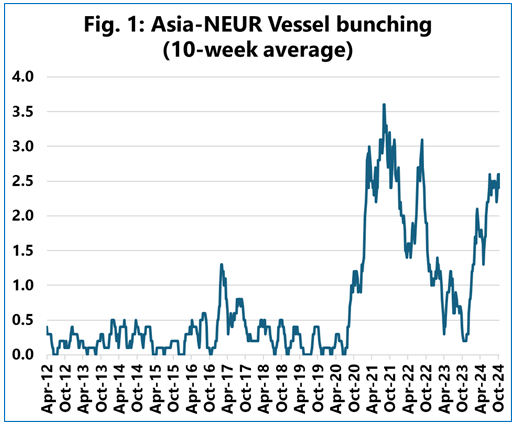
The crisis in the Red Sea has led to "Vessel Bunching," reaching peak levels similar to those seen during the pandemic
3 months ago
The crisis in the Red Sea has led to "Vessel Bunching," reaching peak levels similar to those seen during the pandemic

In its latest report, Sea-Intelligence has explored the “vessel bunching” issue, which refers to the count of weekly sailings surpassing the number of scheduled weekly services.
The Danish maritime data analysis firm clarifies, “From a network design standpoint, each weekly deep-sea liner service would ideally have one vessel departing an origin region per week. However, in practice, multiple vessels may depart on the same service within the same week due to delays, vessel shortages (where two smaller vessels replace one larger vessel), or the addition of extra-loaders to address backlog or high demand.”
For example, if 17 sailings occur in a week with only 15 weekly services, vessel bunching would amount to 2.
In its Sunday Spotlight issue, Sea-Intelligence calculates vessel bunching as a rolling 10-week average and applies it to the Asia-North Europe trade. Analysts noted that pre-pandemic levels of vessel bunching were relatively low, spiking dramatically during the pandemic but showing signs of normalization by late 2023. However, the recent Red Sea crisis has caused vessel bunching to rise again, approaching pandemic-era peaks.
“Higher vessel bunching intensifies pressure on ports and terminals,” explains Alan Murphy, CEO of Sea-Intelligence. “Even if total capacity remains consistent over two weeks with one week having no sailings followed by two sailings the next this setup leads to excessive workload in one week and none in the other.”
Murphy adds that this irregular flow strains port operations and extends to increased demand on trucking, rail, and barge services.
He concludes, “Vessel bunching serves as an indicator of port pressure and congestion risk. Based on recent data, there is no sign of relief for port congestion in the near term.”
Source: Container News